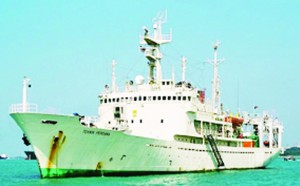
Amid the recent fallout over the seizure of a seismic vessel and ongoing chatter about the Essequibo, Opposition Leader David Granger on Friday issued a warning to the government to safeguard Guyana against the peril of a renewed Venezuelan position to block economic development in the Essequibo.
Granger said his coalition, A Partnership For National Unity (APNU), strongly believes that the move by the Bolivarian Navy of Venezuela PC 23 Yekuana vessel to seize RV Teknik Perdana was intended to bar economic development in Essequibo. At the time, the vessel was conducting seismic surveys in Guyana’s Exclusive Economic Zone on October 10 when it was intercepted.
The leader of the opposition said the seizure was unlawful; in particular, the unwarranted use of force goes against the Charter of the United Nations.
Granger suggested that Venezuela’s action is consistent with past occurrences as he alluded to the ‘Essequibo Annexation’. “The Venezuelan government, under President Raúl Leoni Otero (1964-1969), placed an advertisement in the Times newspaper of London on June 15, 1968 to the effect that the Essequibo belonged to Venezuela and that it would not recognise economic concessions granted there by the Guyana government,” Granger explained.
He further stated that President Leoni had also issued Decreto No 1.152 on July 9, 1968 claiming a nine-mile wide belt of sea along Guyana’s entire Essequibo coast. Additionally, President Rafael Antonio Caldera Rodriguez (1969-1974) had blocked Guyana’s attempt to permit petroleum exploration rights in the Essequibo to DEMITEX, a German company.
“Mazaruni obstruction”
In flipping back the pages of history, the opposition leader alluded to the “Mazaruni obstruction” when President Luis Campins prevented the development of the Upper Mazaruni Hydropower project.
Granger explained that “he issued a communiqué in April 1981 stating that, because of “Venezuela’s claim on the Essequibo territory”, it “asserted the rejection of Venezuela to the hydroelectric project of the upper Mazaruni.”
In supporting the Venezuelan government position, Foreign Minister José Alberto Zambrano Velasco wrote a letter giving the President of the World Bank an ultimatum to refrain from financing the Upper Mazaruni Hydro-Electric Project.
In 1978, President Carlos Andres Perez Rodriguez had indicated Venezuela’s willingness to financially support the hydropower Project, when he visited Guyana. But at the same time, Rodriguez made known his country’s geopolitical interest in gaining access to the Atlantic from the Orinoco delta by offering to reduce the territorial claim to about 31,000 square kilometres in return for the Essequibo coast.
“President Pérez then signed the Treaty between the Republic of Trinidad and Tobago and the Republic of Venezuela on the Delimitation of Marine and Sub-Marine Areas on April 18, 1990 with Prime Minister Arthur Robinson. Both states sought to protect their own economic interests without resorting to a more appropriate multilateral mechanism by consulting Barbados, Grenada and Guyana which the determination of maritime boundaries warranted. Venezuela sought a strategic Salida al Atlántico and Trinidad and Tobago sought access to new areas of potential hydrocarbon resources.”
Despite Venezuela’s generosity, Granger pointed out that the country has never altered its maritime strategy or policy relating to the Essequibo. “Its quest for access to the Atlantic Ocean is critical to understanding last October’s Yekuana incident,” he posited.
APNU is also calling on Venezuela to comply with Article 33 of the Charter of the United Nations for the Pacific Settlement of Disputes and to desist from resorting to force in the Guyana-Venezuela matter. The coalition is also calling on the PPP/ C to adopt a bipartisan approach regarding all territorial matters, as it emphasises the importance of a Border and National Security Commission.
“APNU further calls on Guyana’s diplomats to remain awake and alert so as not to sleepwalk into another economic blockade. Guyanese must not be mesmerised by the mirage of Venezuelan magnanimity.”
APNU Shadow Foreign Affairs Minister Debra Backer said, as Venezuela attempts to command naval power, Guyana must remain resolute. While APNU, the People’s Progressive Party/ Civic (PPP/ C) and the Alliance For Change (AFC) share different views, all parties must work together to safeguard the integrity of the nation. She stressed that Guyana must have a solid position – a collective position to guard against aggression by Venezuela.



